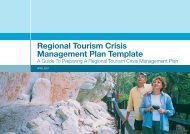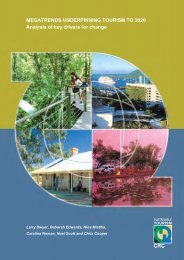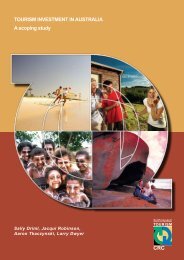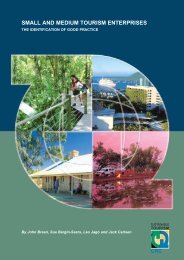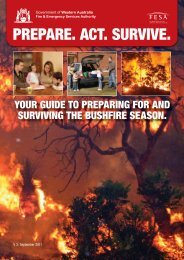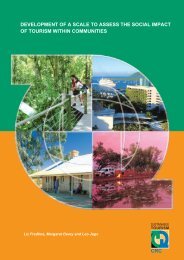Tourism Risk Management - Sustainable Tourism Online
Tourism Risk Management - Sustainable Tourism Online
Tourism Risk Management - Sustainable Tourism Online
You also want an ePaper? Increase the reach of your titles
YUMPU automatically turns print PDFs into web optimized ePapers that Google loves.
• Discussion Exercises<br />
A discussion exercise produces a situation and crisis management problems for participants to<br />
address. It depends upon a highly skilled facilitator and is a very effective and cost efficient method of<br />
testing plans, procedures and personnel. Whilst it does not produce all the pressure of crisis<br />
conditions, participants are required to think and react under some pressure.<br />
• Functional exercises<br />
These are exercises which allow participants to practise information processing, resource<br />
management and decision-making skills in a crisis operations centre environment. These test the<br />
management of events and expose members of the crisis management team to considerable<br />
pressure and they are critical to developing a high level of preparedness to respond to crises.<br />
Importantly, though, exercises need not always be a formal procedure necessitating planning,<br />
development and the use of a skilled facilitator. Destinations can use crises experienced by other<br />
destinations to consider their own level of preparedness. Such informal exercises are based upon<br />
personnel discussing the following simple questions against a given scenario:<br />
• What would we do if that happened in our region?<br />
• What would be the implications of such a crisis for our business operations?<br />
• How would it affect visitors and potential travellers?<br />
• What would we do about it?<br />
• What are the problems which we would have to face?<br />
• How would media and public relations issues be managed?<br />
• Do we need any additional training, equipment or other resources to manage such a crisis?<br />
• How would tourism here be affected if it happened at a nearby destination?<br />
Training and exercising should be ongoing processes if you are to develop and maintain the high<br />
level of preparedness necessary for an efficient and effective response to a crisis. That depends, at<br />
least in part, on the development of an appropriate attitude: one which identifies the need for crisis<br />
preparedness activities to become a part of normal business routine, not merely isolated or<br />
occasional measures adopted to satisfy a formal requirement.<br />
The <strong>Tourism</strong> Crisis Planning Process<br />
Crisis planning is a PROCESS. A written plan is just one outcome of the ongoing process, but it’s not<br />
an end point. A planning committee cannot rest on its laurels once the plan has been produced.<br />
Personnel must be trained and tested; plans must be regularly tested, reviewed and updated.<br />
Destinations should learn from the crises which other destinations experience and incorporate those<br />
lessons into their own preparedness activities.<br />
A crisis management plan will get you started in a crisis. Planning must continue during crisis<br />
response and recovery operations, when the crisis management team will have to develop short-term<br />
plans for the following few hours of operation (known as tactical plans) and longer-term plans for the<br />
following 24 to 48 hours (strategic plans). As the team assesses the situation and decides upon<br />
essential tasks and priorities in response and recovery, so plans have to be developed for their<br />
implementation. This is not a complicated process, but a normal business approach where a<br />
management team determines what needs to be done and how they will go about it.<br />
<strong>Tourism</strong> <strong>Risk</strong> <strong>Management</strong> – An Authoritative Guide to Managing Crises in <strong>Tourism</strong> 57




